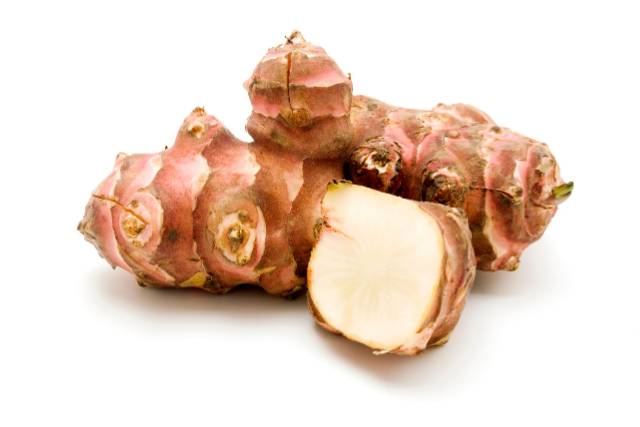
Sunchokes: Health Benefits and Nutritional Value
Sunchoke is a modest tuber reveling in its understated brilliance as the sun's golden rays dance upon the land. While this is happening, the sunchoke is there. In addition to having a taste of earthy sweetness, the sunchoke rises from the ground like a hidden gem waiting to be discovered. Its name gives the impression that it has a strong affinity for the sun.
Its knobby appearance betrays the gourmet treasure that lies inside, hidden under the beautiful foliage surrounding it. Come along with us as we go on an adventure into the realm of sunchokes, a place where tradition and innovation coexist and where the abundance of the land satisfies the senses in surprising ways.
Sunchokes, often called Jerusalem artichokes, are a kind of root vegetable that is a sunflower family member. No, they are not artichokes, and they are not from Jerusalem, even though they have that name. The sunchokes are indigenous to North America and were farmed by Native American tribes for a significant amount of time before the arrival of European immigrants.
The skin of these tubers is often left unpeeled for cooking purposes since it is thin and brownish. The tubers have a knobby, uneven form. Because the flesh is crisp, crunchy, and somewhat nutty and tastes similar to that of artichokes, the fruit is called "Jerusalem artichokes." On the other hand, they are more closely related to sunflowers, which is why they are also often called "sunchokes."
Because of their adaptability in the kitchen, sunchokes are highly regarded. They have a texture that can stand up well in a variety of recipes, such as soups, salads, stir-fries, and roasted vegetable medleys. They may be consumed either raw or cooked. In addition, they are highly prized for their nutritional content, since they are an excellent source of fiber, potassium, and iron.
Even though sunchokes are known for their culinary appeal, they are less readily available in grocery stores than other root vegetables. However, you can often get them at farmer's markets or grow them in your backyard garden. However, in recent years, they have become more popular because of the distinctive taste they possess and the possible health advantages they may provide.
Rich in Fiber
In addition to being an excellent source of dietary fiber, sunchokes also contain soluble and insoluble fiber. Fiber is one of the most important nutrients for digestive health because it helps maintain regular bowel movements, avoids constipation, and promotes a healthy microbiota in the gut.
Prebiotic Properties
An example of a soluble fiber that functions as a prebiotic is inulin, which may be found in sunchokes. A healthy balance of gut flora may be promoted by prebiotics, which provide nourishment to the beneficial bacteria that live in the gut. The health of the digestive system may be improved, the immune system can be strengthened, and even mood and cognitive function may be enhanced.
Low Glycemic Index
Compared to foods with a high glycemic index (GI), sunchokes have a low GI, which indicates that they promote a slower and more consistent rise in blood sugar levels. People currently monitoring their blood sugar levels or with diabetes may benefit from this feature.
Rich in Potassium
The potassium included in sunchokes is an essential mineral that plays a significant part in maintaining appropriate blood pressure levels and supporting heart health. Sunchokes are a rich source of potassium. In addition, potassium is essential for maintaining proper muscular function and regulating fluid balance in the body.
Source of Iron
The creation of red blood cells and the transportation of oxygen throughout the body both need a certain quantity of iron, which may be found in limited amounts in sunchokes. To avoid iron deficiency anemia and keep one's general health in good condition, consuming an adequate amount of iron is essential.
Nutrient Density
Although they contain a relatively low number of calories, sunchokes are an excellent source of vital nutrients such as vitamin C, B6, niacin, and thiamine. The metabolism, the creation of energy, and their general well-being are all affected by these vitamins in various ways.
Weight Management
Sunchokes, characterized by their high fiber content and low-calorie density, can contribute to feelings of fullness and satisfaction. When included in a balanced diet, sunchokes also have the potential to assist with weight control or weight reduction attempts.
Anti-Inflammatory Properties
Several studies have shown that inulin, a kind of soluble fiber found in sunchokes, may possess anti-inflammatory properties. These properties might be advantageous for lowering the risk of chronic illnesses that are connected with inflammation.
Even though sunchokes have many positive effects on health, it is essential to remember that individual reactions may differ. Moderation is the key to any meal, and it is vital to combine a range of foods that are high in nutrients into a balanced diet to achieve or maintain maximum health. Moreover, before making significant changes to their diet, persons with certain dietary limitations or medical issues should discuss their options with a qualified dietitian or a healthcare expert.
Disclaimer: The information provided in this article is for general information purposes only. All information in this article is sourced from other websites, and we do not represent any rights regarding the contents and information on the site. All rights belong to their original owner.
